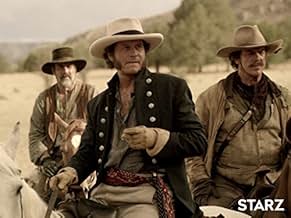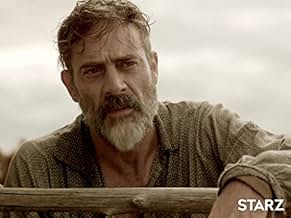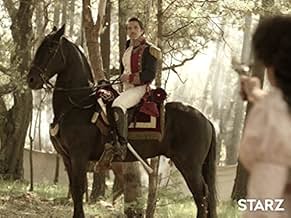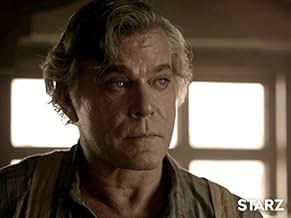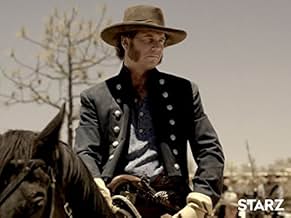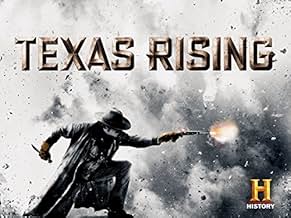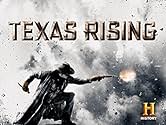ÉVALUATION IMDb
6,7/10
4,7 k
MA NOTE
Ajouter une intrigue dans votre langueThe story of how the Texas Rangers were created.The story of how the Texas Rangers were created.The story of how the Texas Rangers were created.
- Nommé pour 3 prix Primetime Emmy
- 3 victoires et 13 nominations au total
Parcourir les épisodes
Histoire
Le saviez-vous
- AnecdotesBill Paxton is a distant relative of Sam Houston.
- GaffesNone of the landscape resembles the Texas areas portrayed in this series. There are no mountains between San Antonio and Houston. Filming occurred in Mexico.
- ConnexionsEdited into Texas Rising: The Lost Soldier (2015)
Commentaire en vedette
It's laughable the number of reviews on this site from people whinging about inaccurate Texan history. It's the old story folks. When something is advertised as a 10 hour mini-series emanating from the History Channel and not classified as a documentary, I'm expecting, historical fiction, not an encyclopaedic regurgitation of a bunch of historical names and events. Texas Rising is a piece of historical fiction, based on the Texas Revolution against Mexico and how the Texas Rangers were created. If you like decent westerns, well produced with good acting and plenty of action, you should enjoy Texas Rising. If you were genuinely expecting some sort of doco, such as The Civil War, you'll be disappointed.
I've never quite understood why so many so-called educated people continually have this issue. Historical fiction is a recognised genre of literature and readers rarely raise an eyebrow when authors play fast and loose with the facts to achieve dramatic outcomes. The same thing occurs in Texas Rising, where plenty of liberties are taken for poetic licence. This includes characters being created, who sit alongside real historical figures in the narrative. At the end of the final episode, the production scrolled through the major real life characters represented in the series adding brief bios about their lives, during and after the events we see detailed in the show. Persona not represented were obviously fictional, for those viewers who were gnashing teeth worrying about that sort of thing, while continuing to watch what was clearly a non-documentary. But for one with a half-way educated mind, let's just say it's not rocket science difficult to generally discern between fact and fiction as to what you are watching.
I appreciated the opportunity to get a bit of an insight into the events occurring after the fall of The Alamo and to be introduced to President Andrew Jackson, General Sam Houston, the early rag-tag Texas Rangers led by the delightfully named Captain Deaf Smith and the legendary "Yellow Rose of Texas". I should mention Jeffrey Dean Morgan's outstanding and affecting turn as the consumptive, but quietly inspiring leader Smith and the terrific chemistry displayed between his character and Bill Paxton's salty, but confidently intelligent Houston. For those used to seeing Morgan bulked up in "tough guy action mode", your eyes may pop out, as you witness Smith's (real life) physical deterioration during the course of the series.
Dramatically and thematically I will agree with those critics who suggest that the overall tone of Texas Rising does appear to almost constitute "a love letter to the Lone Star State"and a conservative mainstream view of Texan history. In other words, there are few sympathetic perspectives to be seen from the Mexican or Native American fronts. They are largely depicted one dimensionally, as the villains of the piece, dispossessing the determined white settlers with their friendly, contented black slaves (some who were supposedly "free"). I did think this was a little unusual in an extended mini-series. There was a footnote after the final episode that a follow-up series concentrating on the Comanche Wars was planned, where one would think alternative frames of reference should well be approached.
Nevertheless, keeping the above in mind, I think those interested in a dramatic western perspective of lead-up events to the establishment of the Republic of Texas will not fail to be entertained by Texas Rising.
I've never quite understood why so many so-called educated people continually have this issue. Historical fiction is a recognised genre of literature and readers rarely raise an eyebrow when authors play fast and loose with the facts to achieve dramatic outcomes. The same thing occurs in Texas Rising, where plenty of liberties are taken for poetic licence. This includes characters being created, who sit alongside real historical figures in the narrative. At the end of the final episode, the production scrolled through the major real life characters represented in the series adding brief bios about their lives, during and after the events we see detailed in the show. Persona not represented were obviously fictional, for those viewers who were gnashing teeth worrying about that sort of thing, while continuing to watch what was clearly a non-documentary. But for one with a half-way educated mind, let's just say it's not rocket science difficult to generally discern between fact and fiction as to what you are watching.
I appreciated the opportunity to get a bit of an insight into the events occurring after the fall of The Alamo and to be introduced to President Andrew Jackson, General Sam Houston, the early rag-tag Texas Rangers led by the delightfully named Captain Deaf Smith and the legendary "Yellow Rose of Texas". I should mention Jeffrey Dean Morgan's outstanding and affecting turn as the consumptive, but quietly inspiring leader Smith and the terrific chemistry displayed between his character and Bill Paxton's salty, but confidently intelligent Houston. For those used to seeing Morgan bulked up in "tough guy action mode", your eyes may pop out, as you witness Smith's (real life) physical deterioration during the course of the series.
Dramatically and thematically I will agree with those critics who suggest that the overall tone of Texas Rising does appear to almost constitute "a love letter to the Lone Star State"and a conservative mainstream view of Texan history. In other words, there are few sympathetic perspectives to be seen from the Mexican or Native American fronts. They are largely depicted one dimensionally, as the villains of the piece, dispossessing the determined white settlers with their friendly, contented black slaves (some who were supposedly "free"). I did think this was a little unusual in an extended mini-series. There was a footnote after the final episode that a follow-up series concentrating on the Comanche Wars was planned, where one would think alternative frames of reference should well be approached.
Nevertheless, keeping the above in mind, I think those interested in a dramatic western perspective of lead-up events to the establishment of the Republic of Texas will not fail to be entertained by Texas Rising.
- spookyrat1
- 12 mai 2019
- Lien permanent
Meilleurs choix
Connectez-vous pour évaluer et surveiller les recommandations personnalisées
Détails
Contribuer à cette page
Suggérer une modification ou ajouter du contenu manquant

Lacune principale
By what name was Texas Rising (2015) officially released in India in English?
Répondre


